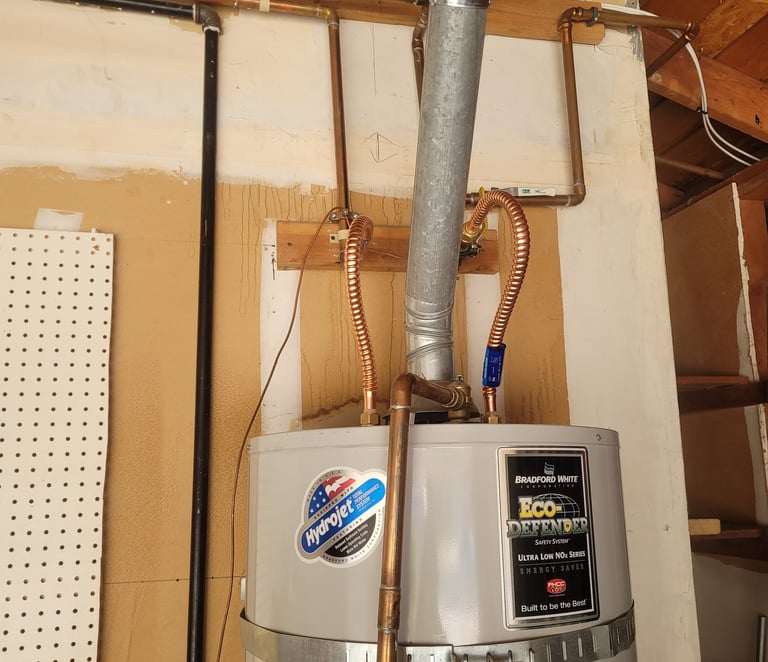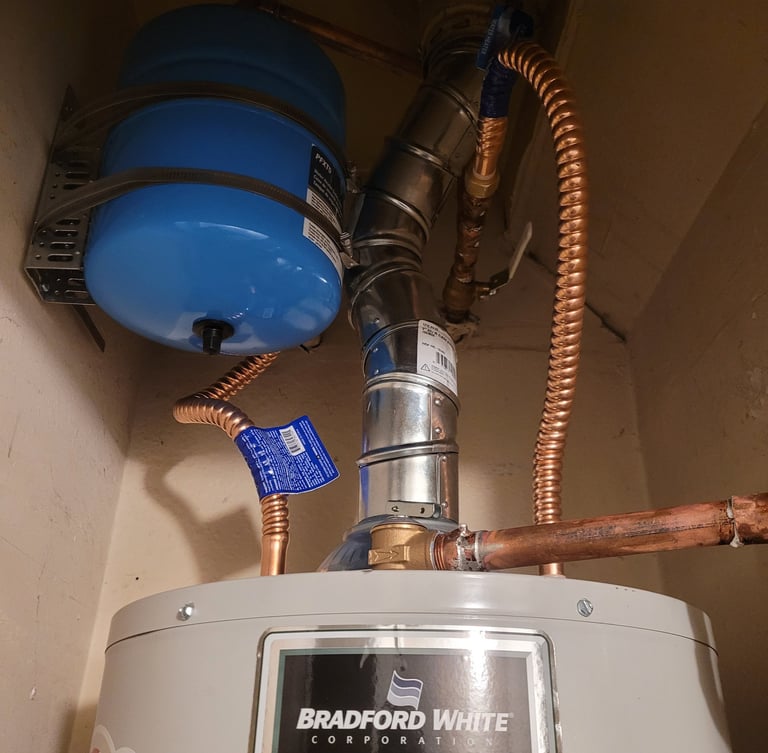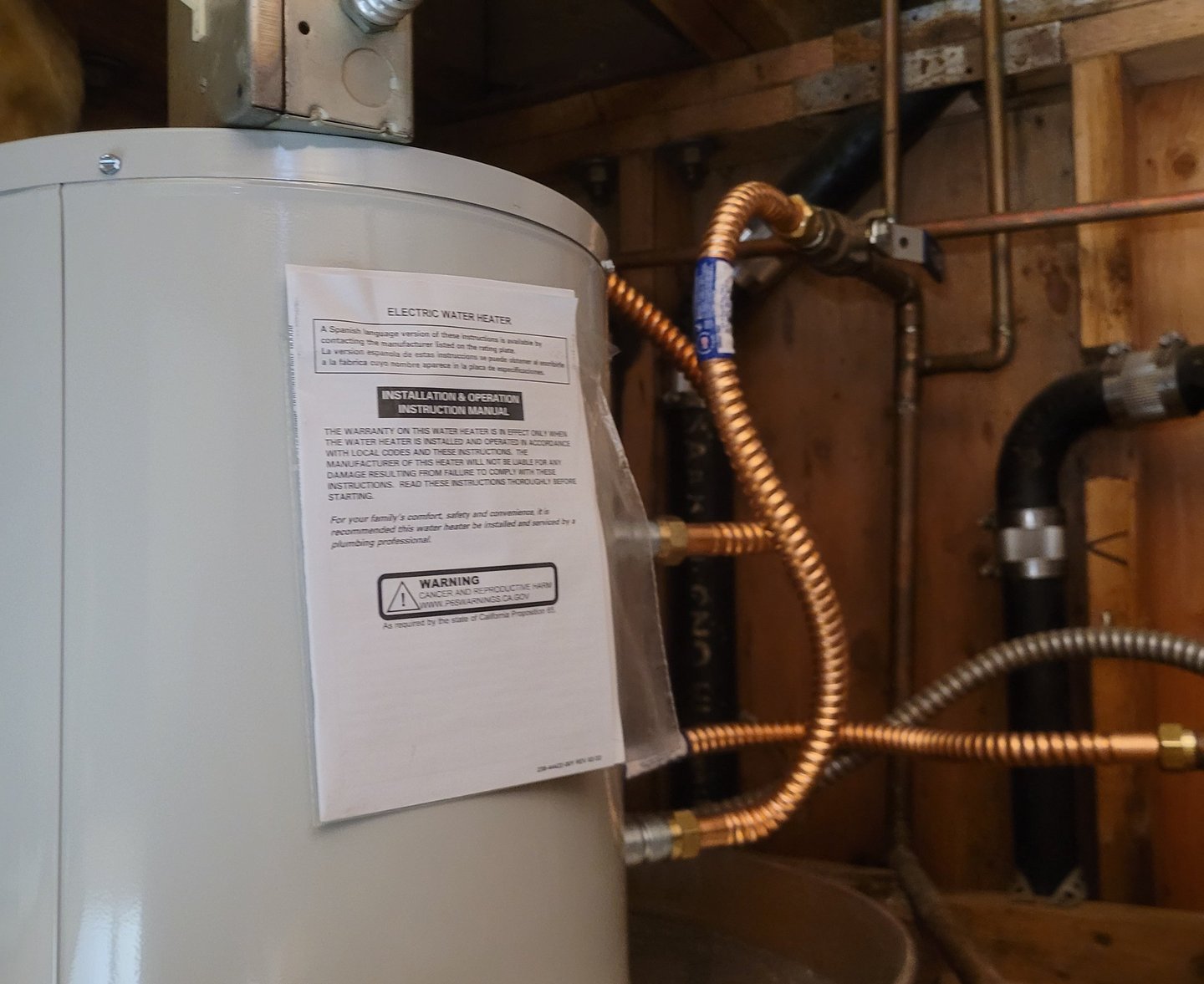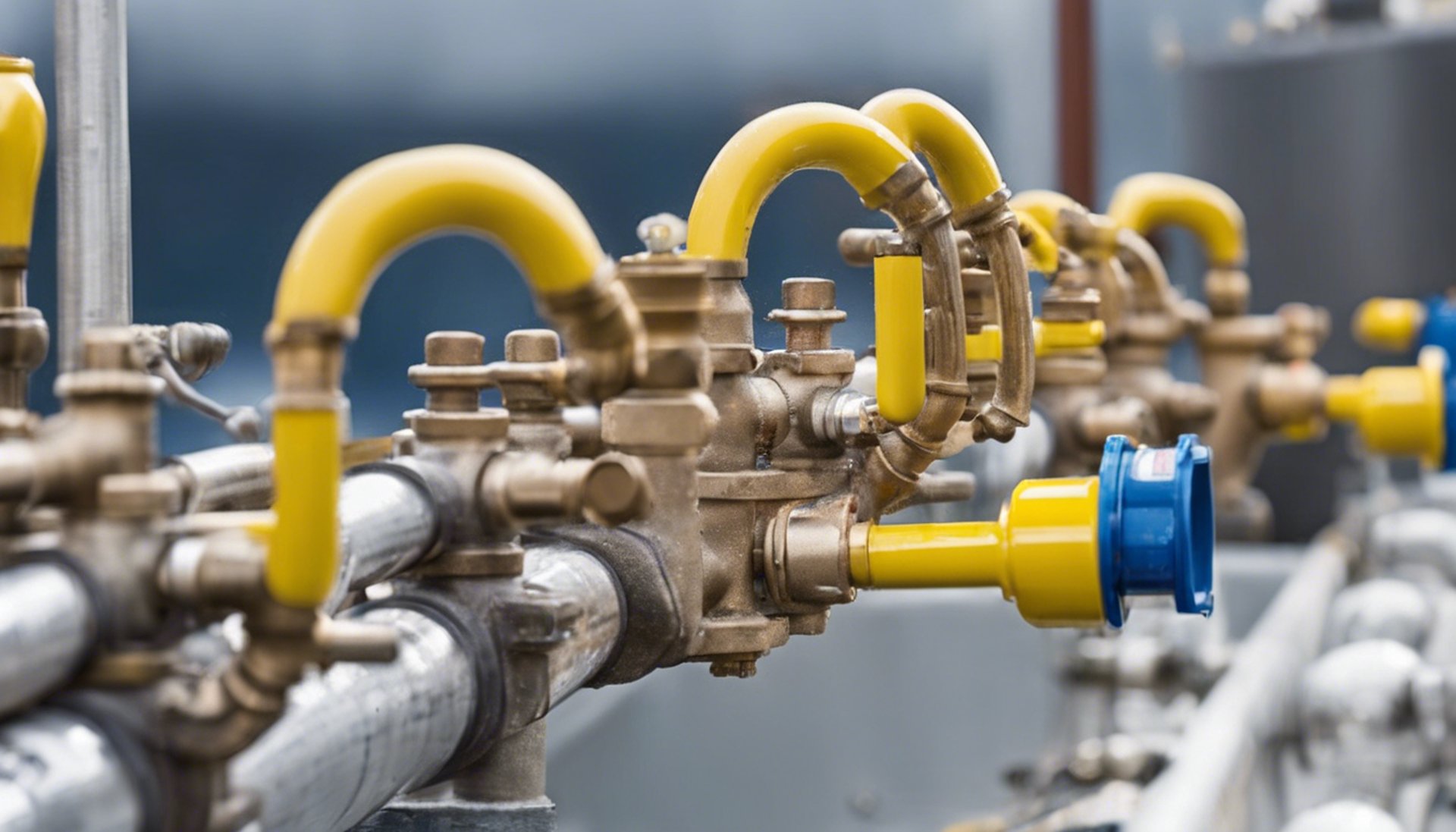WATER HEATER & TANKLESS
Gas Water Heater
When it comes to ensuring comfortable and reliable hot water access in both commercial and residential settings, choosing the right water heater is crucial. Water heaters serve as an essential component of modern life, providing hot water for numerous applications, from showers and dishwashing to heating systems in various commercial facilities.
In this guide, we'll explore the distinctions between traditional tank water heaters and tankless models, helping you make an informed decision on which system best fits your needs.
When it comes to ensuring that your residential or commercial establishment enjoys a reliable and efficient hot water supply, choosing the right electric water heater is essential. Electric water heaters are popular choices across various applications, providing convenience and comfort for both homeowners and business owners alike. This guide will break down the key aspects of commercial and residential electric water heaters, helping you to understand their features, advantages, and considerations for installation and maintenance. Overview of Electric Water Heaters Electric water heaters utilize electrical resistance coils or heat pump technology to heat water, serving as an efficient solution for both residential and commercial properties. They can be categorized mainly into two types: storage tank heaters and tankless (or on-demand) heaters.
Tankless Water Heaters
Tankless Water Heaters Overview:
Tankless water heaters, also known as on-demand water heaters, heat water directly without the use of a storage tank. When a hot water tap is turned on, cold water travels through a pipe into the unit, where it is heated by either gas burners or electric elements. Advantages:
1. Endless Hot Water Supply: One of the most appealing features of tankless systems is their ability to provide an uninterrupted flow of hot water, making them ideal for large families or businesses with high demands.
2. Energy Efficiency: Tankless models are more energy-efficient since they heat water only when needed, resulting in lower energy bills and a reduced carbon footprint.
3. Compact Design: These units are much smaller than traditional tank heaters, allowing for flexibility in installation, even in tight spaces. Disadvantages:
1. Higher Initial Cost: The upfront cost of purchasing and installing a tankless water heater is typically higher, which may be a deterrent for some potential users.
2. Flow Rate Limitations: Depending on the size and specifications, tankless systems can struggle to provide hot water to multiple outlets simultaneously, particularly if high demand is required.
3. Complex Installation: Installation can be more complicated than traditional models, potentially requiring upgrades to existing plumbing or electrical systems to accommodate the technology.


Choosing the Right Water Heater Selecting between a tank and tankless water heater ultimately depends on various factors including your budget, hot water needs, and space constraints. Here are some considerations to guide your decision:
1. Household Size and Hot Water Demand: If you have a small household with limited hot water needs, a traditional tank heater may suffice. Conversely, larger families or businesses that require multiple sources of hot water simultaneously may benefit from the capabilities of a tankless system.
2. Budget Constraints: Evaluate the overall cost—both upfront and long-term. While tankless systems might save money over time due to their energy efficiency, the initial investment can be significantly higher.
3. Space Availability: In homes or businesses where space is at a premium, tankless water heaters can be an excellent choice due to their compact size. However, consider whether you have the additional electrical or gas capacities needed for installation.
4. Future Needs: Consider any potential changes that could affect your hot water consumption, such as family size changes, the addition of appliances, or expansion of business operations.
Conclusion Both traditional tank water heaters and tankless systems have their unique advantages and challenges. By understanding their differences and analyzing your specific needs, you’ll be better equipped to make an informed decision that aligns with your lifestyle or business requirements. Investing in the right water heater will not only enhance comfort but can also lead to long-term savings and improved energy efficiency.


Electric & Solar Water Heater
Solar Water Heaters
Solar Water Heater System: A Sustainable Solution for Residential and Commercial Use
Introduction to Solar Water Heating As the world shifts towards more sustainable energy solutions, solar water heating systems are gaining popularity in both residential and commercial sectors. These systems utilize the sun's energy to heat water, providing a renewable and cost-effective solution for various hot water needs. By harnessing solar energy, users can significantly reduce their reliance on conventional energy sources, lowering both utility bills and carbon footprints.
How Solar Water Heaters Work Solar water heating systems generally consist of three main components: solar collectors, a storage tank, and an optional backup system. The solar collectors absorb sunlight and convert it into heat. This heat is then transferred to the water in the storage tank. -
Solar Collectors: There are two common types of solar collectors—flat-plate collectors and evacuated tube collectors. Flat-plate collectors are more affordable and work well in sunny, moderate climates, while evacuated tube collectors are more efficient and better suited for colder regions. -
Storage Tank: The heated water is stored in a tank until it is needed for various applications, such as bathing, washing dishes, or even heating a swimming pool. The size of the storage tank will depend on the household or business's hot water requirements. -
Backup System: In cases where sunlight is insufficient—such as during cloudy days or winter months—a backup heating system (usually electric or gas) can be activated to ensure an uninterrupted hot water supply.
Benefits of Solar Water Heating
1. Cost Efficiency: By utilizing solar energy, users can greatly reduce their energy bills. After the initial investment, the operational costs of solar water heaters are significantly lower compared to traditional water heating systems.
2. Environmentally Friendly: Solar water heaters produce clean energy and help to mitigate the effects of climate change. By using renewable solar energy, users can reduce greenhouse gas emissions and reliance on fossil fuels.
3. Increased Property Value: Installing a solar water heating system can enhance property value, making homes and businesses more attractive to potential buyers. As sustainability becomes more significant, many buyers are looking for energy efficiency in their future properties.
4. Low Maintenance: Solar water heating systems require minimal maintenance. Routine checks and occasional cleaning of the collectors are usually sufficient to keep the system functioning effectively.
Residential Solar Water Heating Systems For residential use, solar water heaters are primarily used to fulfill daily hot water needs such as bathing, cooking, and cleaning. Homeowners can select between active and passive solar heating systems: -
Active Systems: These systems use pumps and controls to circulate water between the solar collectors and the storage tank. They are generally more efficient but come at a higher initial cost. -
Passive Systems: These involve no moving parts, relying on natural convection to circulate water. They are simpler and more reliable but may not be as efficient as active systems.
Commercial Solar Water Heating Systems In commercial settings, solar water heating systems can be used for larger applications, like hotels, restaurants, and laundries. -
Large Scale Applications: Hotels and resorts can significantly cut operating costs by utilizing solar systems for laundry services, swimming pool heating, and kitchen needs. -
Return on Investment: While commercial systems require a larger upfront investment, the potential savings and incentives (such as tax credits and rebates) can yield a favorable return on investment over time.
Considerations for Installation When considering a solar water heater system, both residential and commercial clients should factor in several aspects: - Local Climate: The efficiency of solar water heaters varies greatly depending on geographic location and local weather patterns. Regions that receive abundant sunlight year-round will obviously yield better performance. -
Space Requirements: Proper installation space is essential, with roof orientation and angle playing a crucial role in maximizing sunlight exposure. -
Regulations and Incentives: Various governments offer incentives for solar installations which can reduce the upfront costs. Understanding local regulations and permitting processes is also crucial for a successful installation.
Conclusion Solar water heating systems represent a forward-thinking approach to addressing energy demands in both residential and commercial settings. By embracing solar technology, users can enjoy significant energy savings while contributing to a more sustainable future. With the growing awareness of environmental issues, investing in a solar water heating system is not only a sound financial choice but also a commitment to preserving the planet for future generations.


Electric Water Heaters
Electric Water Heaters Electric water heaters utilize electrical resistance coils or heat pump technology to heat water, serving as an efficient solution for both residential and commercial properties. They can be categorized mainly into two types: storage tank heaters and tankless (or on-demand) heaters.
1. Storage Tank Electric Water Heaters: Storage tank heaters come with an insulated storage tank that holds a specific volume of hot water, readily available for use. They are measured by their tank capacity, typically ranging from 20 to 80 gallons for residential uses, and can be larger for commercial needs.
Advantages of Storage Tank Heaters: - Immediate hot water availability upon demand. - Simple installation and maintenance processes. - More affordable upfront costs compared to tankless units.
2. Tankless Electric Water Heaters: Tankless heaters provide hot water only when needed. They heat water on demand, making them a more energy-efficient option over time. You can expect a lifespan of about 15 - 20 years, which often outlasts conventional storage tank systems.
Advantages of Tankless Heaters: - Energy savings since they only operate when hot water is needed. - Compact size allows for flexible installation options, perfect for smaller spaces or commercial uses with specific demands. - Longer operational lifespan reduces replacement frequency.
Key Considerations for Residential Electric Water Heaters When selecting an electric water heater for residential use, homeowners should consider several factors:
1. Consumption Needs Understanding household hot water needs is crucial. Average residential consumption can vary based on family size, lifestyle habits, and peak usage times (e.g., mornings vs. evenings). A professional evaluation can assist in determining the appropriate capacity.
2. Energy Efficiency Look for the Energy Factor (EF) rating when assessing energy efficiency. Higher EF values indicate more efficient units. Energy-efficient models may also qualify for tax credits or rebates, making them financially appealing over time.
3. Space Availability Evaluate the installation space in your home. Traditional storage models require more space, while tankless options are compact and can often be installed in closets or under sinks. Ensure that the electric supply matches the requirements of the chosen model.
4. Budget Establishing a clear budget and including installation costs is vital. While tankless models may come with higher upfront costs, they can save money on energy bills over their lifespan. Key Considerations for Commercial Electric Water Heaters For commercial settings, selecting an electric water heater includes additional considerations due to higher demand and regulatory factors:
1. Scale of Operations The size and type of commercial operation influence the choice of water heater. Restaurants, hotels, and healthcare facilities have different requirements that may necessitate larger capacities or specialized solutions.
2. Compliance and Safety Standards Ensure that the selected water heater complies with local building codes and industry regulations, especially for commercial facilities. Understanding the code requirements can prevent costly fines and ensure operational safety.
3. Recovery Rate The recovery rate indicates how quickly a water heater can replenish its hot water supply. For busy commercial settings, a higher recovery rate may be necessary to meet high demand during peak usage.
4. Reliability and Maintenance Investing in a reputable brand known for reliability is crucial, as commercial environments typically require uninterrupted service. Additionally, establishing a regular maintenance schedule can prolong the lifespan and efficiency of the unit.
Installation and Maintenance **Installation** Hiring certified professionals for installation is critical. They can ensure that the electric connections are correctly made, safety valves are installed, and that the overall setup adheres to national and local codes. **Maintenance** Regular maintenance helps prevent costly repairs and prolongs the life of your water heater. Tasks may include: - Flushing the tank to remove sediment buildup. - Checking the anode rod and replacing it if necessary to prevent corrosion. - Inspecting the heating elements, thermostat, and connections for any wear or malfunction.
The Future of Electric Water Heaters Recent advancements in technology are leading to more efficient electric water heaters that are environmentally friendly. Smart technology integration allows homeowners and business owners to monitor energy usage, adjust temperatures remotely, and receive maintenance alerts, ensuring optimal performance and convenience.
Conclusion In conclusion, whether for residential or commercial use, electric water heaters play a vital role in providing a consistent supply of hot water. The key to selecting the right one lies in understanding your specific needs, considering factors such as capacity, efficiency, installation space, and budget. Consulting with a professional before making your purchase can help you make a confident, informed decision that ensures comfort and efficiency in your daily operations.

Back-flow Test
ASSE CERTIFIED
Open 24-hours, 7 Days a Week for Emergency Services
Non-emergency office Hours
Mon - FRI
8:00 am - 7:00 pm
Sat -
9:00 am - 1:30 pm
Sunday
Closed
CA License number: # 1016374
PLUMBER CA CERTIFIED BACKFLOW NUMBER : 54582
KECKO plumberS TEL phone: 951-505-3815
© 2016. All rights reserved.
LEAK DETECTION
DRAIN CLEANING HYDRO JETTING
Services BACKFLW TESTING HYDRO JETTING ,LEAK DETECTION, PLUMBING REPAIRS, WATER HEATERS AND MUSH MORE... Call us to''TODAY''
RIVERSIDE CA
